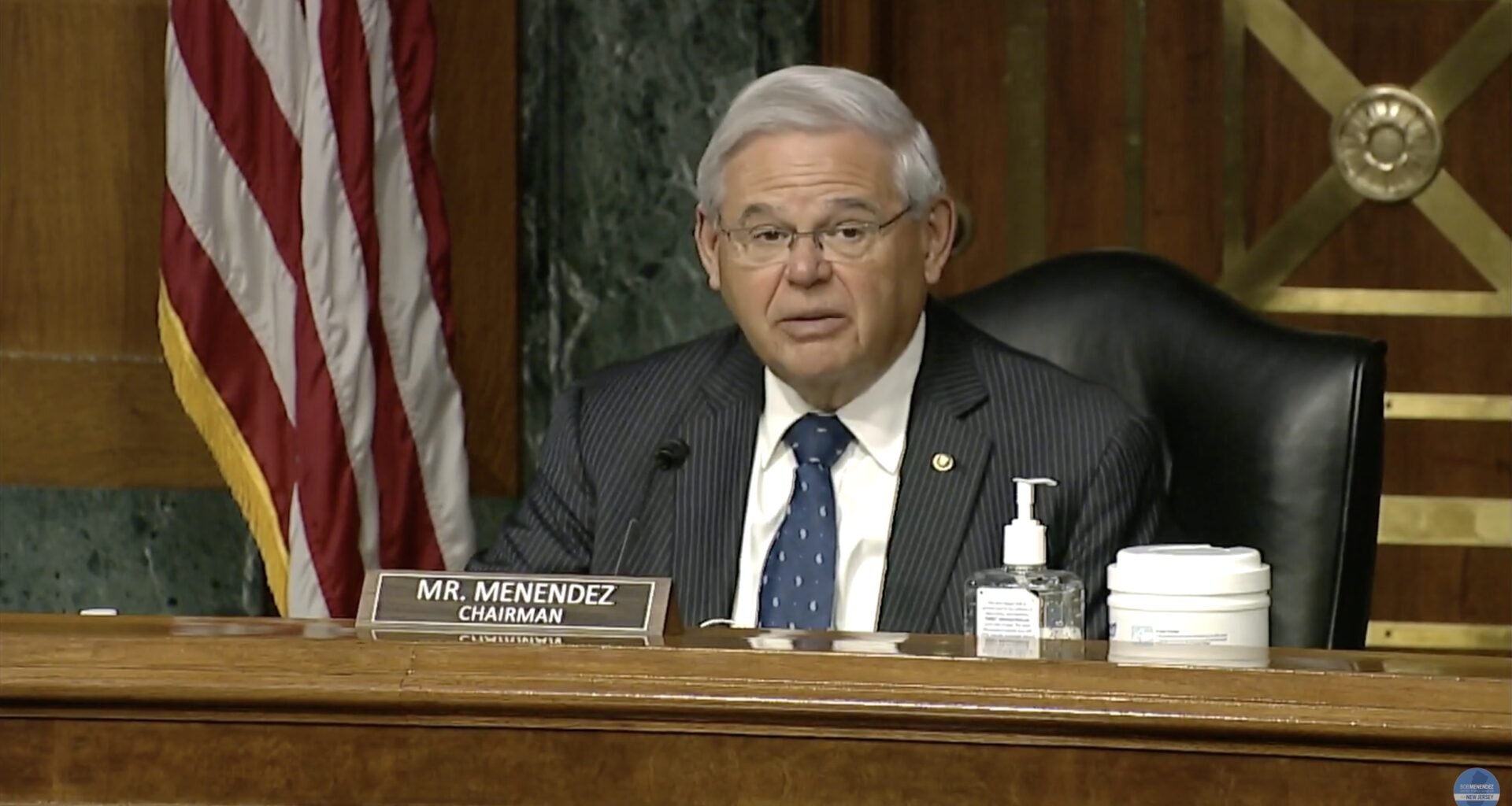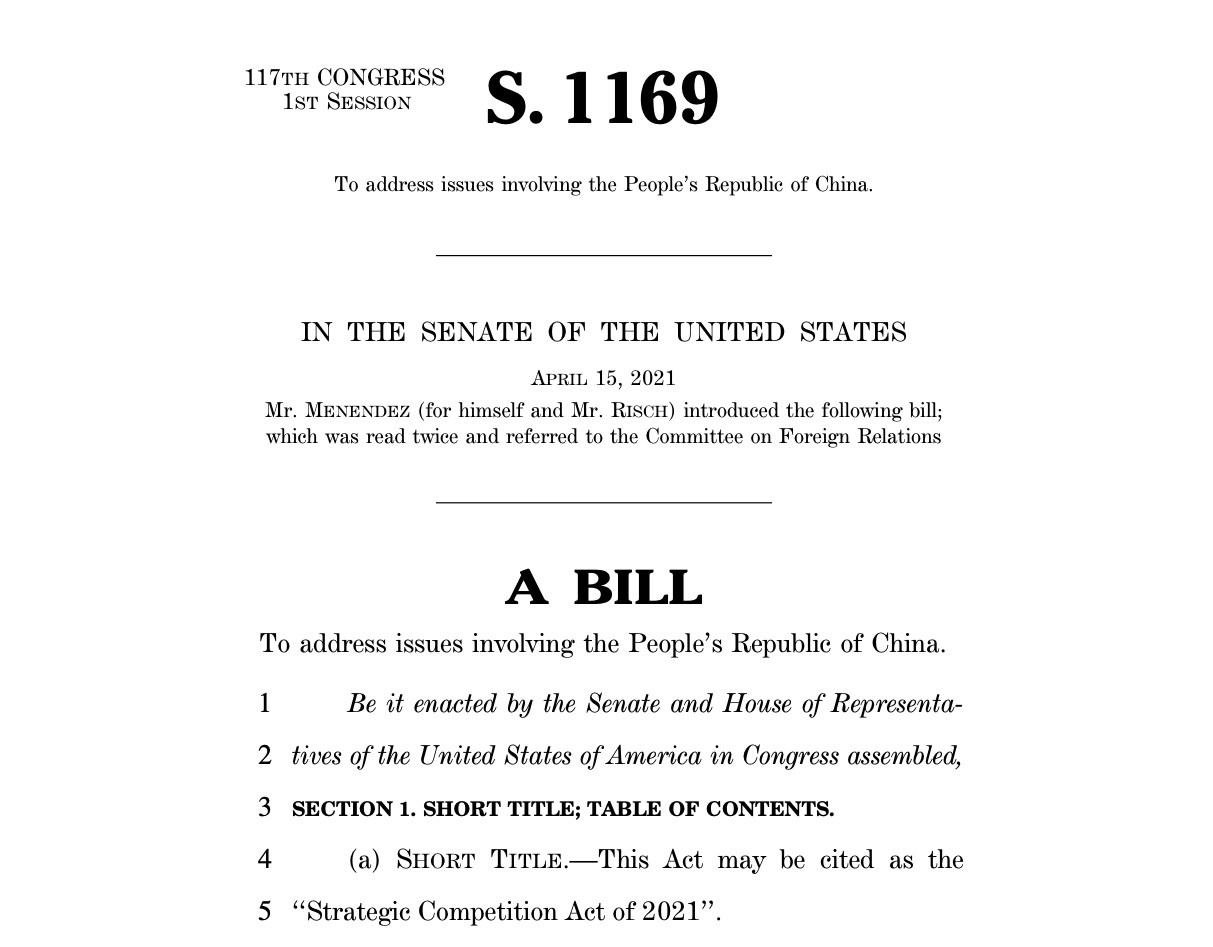USAGM Watch Commentary
A bipartisan bill, S. 1169, the Strategic Competition Act of 2021, introduced by Senate Foreign Relations Committee Chairman, Senator Bob Menendez (D-N.J.) and Republican Ranking Member, Senator Jim Risch (R-Idaho), was approved by the committee on Wednesday and sent to the full Senate for a vote to counter China’s influence and disinformation. Menendez and Risch issued a joint statement on the committee’s passage of the comprehensive China bill.
In its section on international broadcasting, the bipartisan legislation refers mostly to expansion of Radio Free Asia (RFA) programming and orders the U.S. Agency for Global Media (USAGM) to increase funding for RFA’s Mandarin, Tibetan, Uyghur, and Cantonese language services.
For each of fiscal years 2022 through 2026, the bill would give for the United States Agency for Global Media $100,000,000 for ongoing and new programs.
The Voice of America (VOA), criticized in the past for repeating Chinese communist propaganda, would benefit less from the bill than Radio Free Asia. The legislation orders VOA to “establish a real-time disinformation tracking tool similar to Polygraph for Russian language propaganda and misinformation,” but does not call specifically for expanding existing VOA broadcasts to China.
The bill also mentions the Open Technology Fund (OTF), ordering the USAGM grantee to “continue and expand work to support tools and technology to circumvent censorship and surveillance by the CCP, both inside China as well as abroad where China has exported censorship technology, and increase secure peer to peer connectivity and privacy tools.”
Senator Menendez, who was highly critical of former Trump-appointed USAGM CEO, seems also to have doubts about the current USAGM leadership, which includes executives who previously managed agency and VOA programs to Russia, China and Iran when they were reported to be plagued by multiple scandals: a VOA China Branch employee expressing support for the China’s communist government at a social event at the Chinese Embassy in Washington, VOA journalists taking money from a foreign official from Nigeria, posting by the VOA Russian Service of a fake interview with opposition leader Alexei Navalny, employment by VOA of former Kremlin media broadcasters, shortening of a VOA interview with anti-communist Chinese whistleblower and reporting by VOA without challenge of Beijing’s propaganda videos.
According to a report of the Working Group on Chinese Influence Activities in the United States prepared in 2018 by the Hoover Institution at Stanford University and the Center on US-China Relations at Asia Society in New York, “starting in the first decade of the 2000s, the Chinese embassy in Washington, DC, and the leadership of VOA’s Mandarin service began an annual meeting to allow embassy officials to voice their opinions about VOA’s content.”
The Hoover Institution and Asia Society report also said that “VOA personalities have hosted events at the embassy,” and one of VOA’s TV editors “even publicly pledged his allegiance to China at an embassy event.”
It is understandable that Senator Menendez may not have full confidence in some of the USAGM and VOA executives who have been in charge of various agency programs and operations for many years. The legislation orders USAGM to “expand existing training and partnership programs that promote journalistic standards, investigative reporting, cybersecurity, and digital analytics to help expose and counter false CCP narratives.”
ALSO READ: Voice of America Delayed For Five Days Posting Story on Senator Menendez Criticism of USAGM CEO OCB Appointment, USAGM Watch, April 12, 2021.
SEC. 136. SUPPORTING INDEPENDENT MEDIA AND COUNTERING DISINFORMATION.
(a) Findings.—Congress makes the following findings:(1) China is increasing its spending on public diplomacy including influence campaigns, advertising, and investments into state-sponsored media publications outside of China. These include, for example, more than $10,000,000,000 in foreign direct investment in communications infrastructure, platforms, and properties, as well as bringing journalists to China for training programs.
(2) The PRC, through the Voice of China, the United Front Work Department, and UFWD’s many affiliates and proxies, has obtained unfettered access to radio, television, and digital dissemination platforms in numerous languages targeted at citizens in other regions where China has an interest in promoting public sentiment in support of the Chinese Communist Party and expanding the reach of its misleading narratives and propaganda.
(3) Even in Western countries, China spends extensively on influence operations, such as a $500,000,000 advertising campaign to attract cable viewers in Australia and a more than $20,000,000 campaign to influence United States public opinion via the China Daily newspaper supplement.
(b) The United States Agency For Global Media.—The United States Agency for Global Media (USAGM) and affiliate Federal and non-Federal entities shall undertake the following actions to support independent journalism, countering disinformation, and breaking the firewall and combatting surveillance in countries where the Chinese Communist Party and other malign actors are promoting disinformation, propaganda, and manipulated media markets:
(1) Radio Free Asia shall expand domestic coverage and digital programming for all RFA China services and other affiliate language broadcasting services.
(2) USAGM shall increase funding for Radio Free Asia’s Mandarin, Tibetan, Uyghur, and Cantonese language services.
(3) Voice of America shall establish a real-time disinformation tracking tool similar to Polygraph for Russian language propaganda and misinformation.
(4) USAGM shall expand existing training and partnership programs that promote journalistic standards, investigative reporting, cybersecurity, and digital analytics to help expose and counter false CCP narratives.
(5) The Open Technology Fund shall continue and expand work to support tools and technology to circumvent censorship and surveillance by the CCP, both inside China as well as abroad where China has exported censorship technology, and increase secure peer to peer connectivity and privacy tools.
(c) Authorization Of Appropriations.—There is authorized to be appropriated, for each of fiscal years 2022 through 2026 for the United States Agency for Global Media, $100,000,000 for ongoing and new programs to support local media, build independent media, combat Chinese disinformation inside and outside of China, invest in technology to subvert censorship, and monitor and evaluate these programs.
(d) Support For Local Media.—The Secretary of State, acting through the Assistant Secretary of State for Democracy, Human Rights, and Labor and in coordination with the Administrator of the United States Agency for International Development, shall support and train journalists on investigative techniques necessary to ensure public accountability related to the Belt and Road Initiative, the PRC’s surveillance and digital export of technology, and other influence operations abroad direct or directly supported by the Communist Party or the Chinese government.
(e) Internet Freedom Programs.—The Bureau of Democracy, Human Rights, and Labor shall continue to support internet freedom programs.
(f) Authorization Of Appropriations.—There is authorized to be appropriated, for each of fiscal years 2022 through 2026, $170,000,000 for ongoing and new programs in support of press freedom, training, and protection of journalists.
SEC. 137. GLOBAL ENGAGEMENT CENTER.
(a) Finding.—Congress established the Global Engagement Center to “direct, lead, and coordinate efforts” of the Federal Government to “recognize, understand, expose, and counter foreign state and non-state propaganda and disinformation globally”.(b) Extension.—Section 1287(j) of the National Defense Authorization Act for Fiscal Year 2017 (22 U.S.C. 2656 note) is amended by striking “the date that is 8 years after the date of the enactment of this Act” and inserting “December 31, 2027”.
(c) Sense Of Congress.—It is the sense of Congress that the Global Engagement Center should expand its coordinating capacity through the exchange of liaison officers with Federal departments and agencies that manage aspects of identifying and countering foreign disinformation, including the National Counterterrorism Center at the Office of the Director of National Intelligence and from combatant commands.
(d) Hiring Authority.—Notwithstanding any other provision of law, the Secretary of State, during the five year period beginning on the date of the enactment of this Act and solely to carry out functions of the Global Engagement Center, may—
(1) appoint employees without regard to the provisions of title 5, United States Code, regarding appointments in the competitive service; and
(2) fix the basic compensation of such employees without regard to chapter 51 and subchapter III of chapter 53 of such title regarding classification and General Schedule pay rates.


